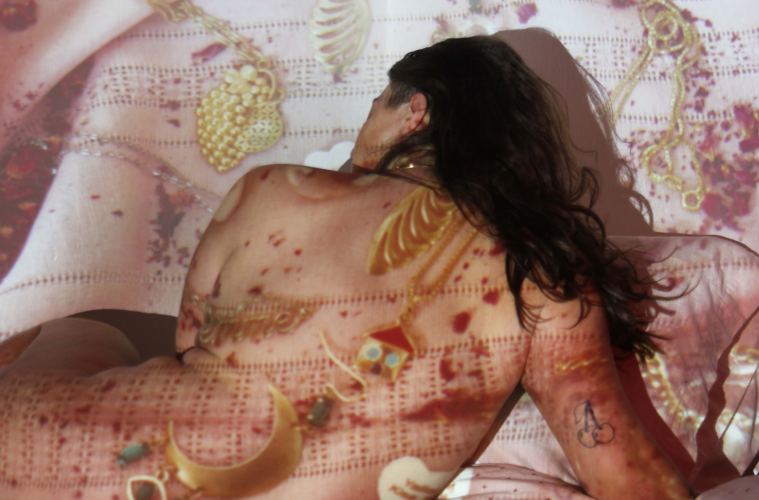Words by: ZAHRA BIN ZAHRA
Photography by: Christina Hajjar
This article is part of the “The Wawa Complex” issue
You give people so much space you could work for NASA.
Your body labels everyone as a threat.
Unsolicited flirtation turns from good old annoying to dangerous.
There is no cure for it.
The scientists couldn’t see it under the microscope, insurance companies don’t cover it, and when brought up to friends, it sounds like a foreign language.
Queer nightclub. Months ago.
Queer friends. Safe.
First dance floor in a long, long time.
Smiles. Lights. A rotating long island iced tea.
Sweet bartender. Whiskey. Pickle juice.
Legs dancing and dancING, and DANCING.
Lights.
You see yourself and those you love. Faces. Beautiful.
Queer bodies dancing.
Safe.
Your body detaches, nonetheless.
Like a pet, a cane, or a bitter child, your body ignores you.
The time of your body doesn’t follow the same time zones you use to schedule your lunch breaks, doctor appointments, and melancholic bedtime.
Your survivor’s body is your dance partner.
It follows TST: trauma standard time. You give it appointments on shared Google Cal.
It doesn’t respond or show up.
You understand and justify it as you do in toxic relationships: It was busy. It got stuck in traffic. It’s not that bad.
The friends you admire have legs that dance like magic.
The body is moving and that’s a good thing, even if it dances with no one, even if it struggles to identify its surroundings.
Your stuck-in-place, dissociated, liquid-noodle legs leave you behind
momentarily.
The beat drops.
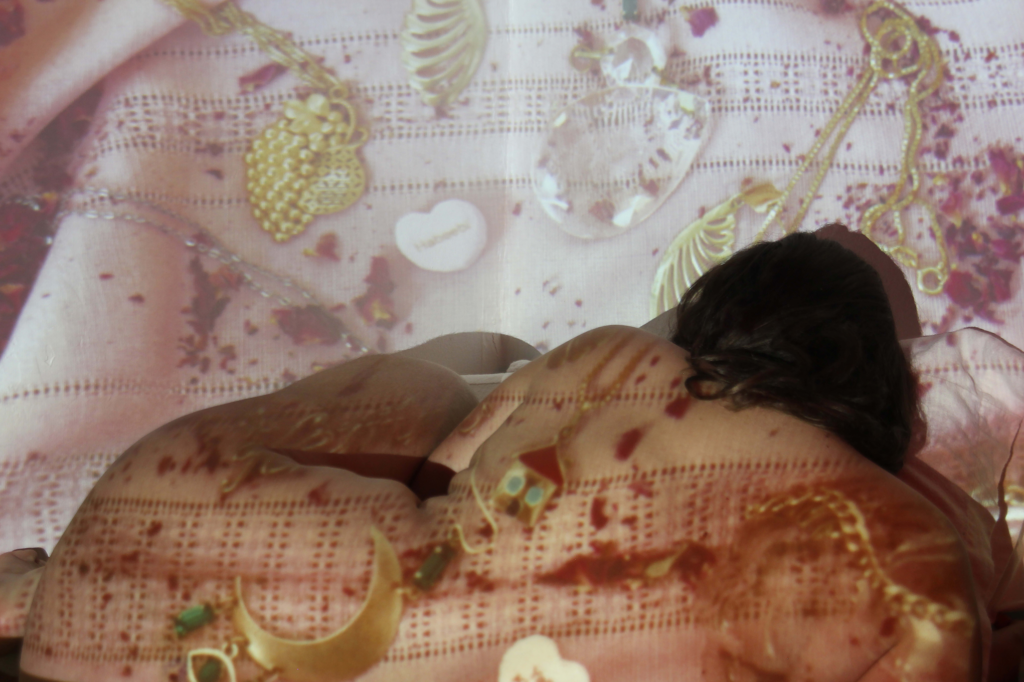
Christina Hajjar, Illuminations, 2020
Having a survivor’s body marks most people as unsafe, leaving only a few with whom a history or a present of safety that’s repeated and copy-pasted until believed, with no gestures linked back to a painful past.
You have two friends who can hold you; both are depressed in bed.
Months and months, your body was scared
of everyone,
like the anime Fruit Basket where people turn into animals whenever they’re held.
One summer, one hug, one minute.
One minute, one human, one hug, the body starts to defrost.
It takes all summer, all fall, and all winter.
Like an Adobe subscription you keep trying to cancel,
it renews itself every time you think you have been released from it.
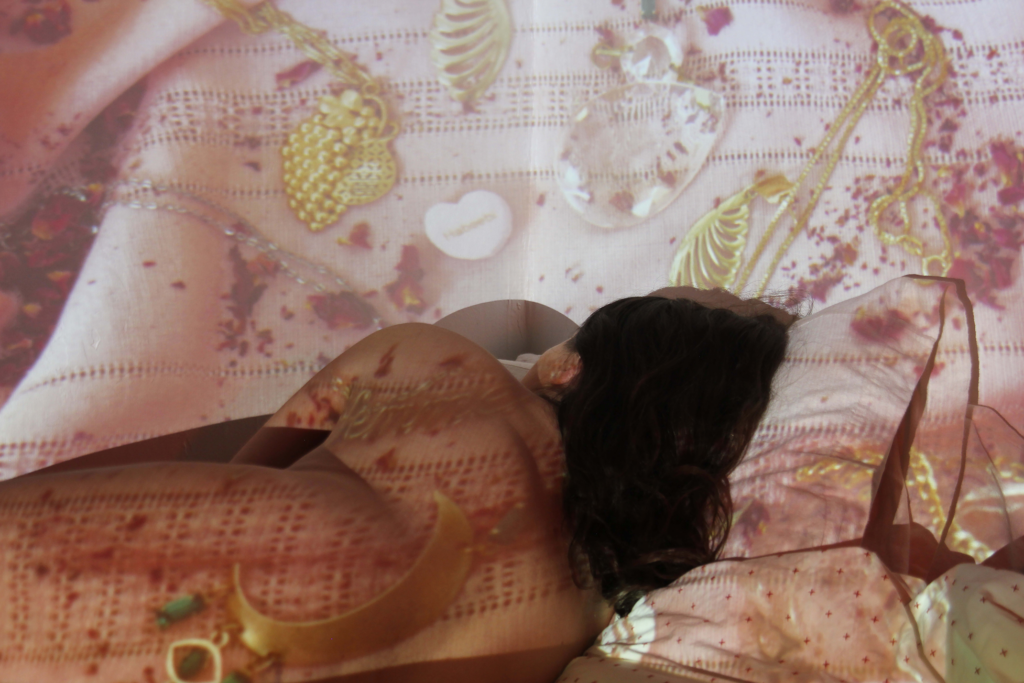
Christina Hajjar, Illuminations, 2020
You wonder how people live feeling that being held is safe and normal,
while you are one of the unlucky ones, the fucked-up normal, the ones keeping panic attacks in business.
Your body reaches overcapacity with unprocessed experiences and unclassified emotions.
They explode, scattering old memories into a swirling tornado.
Furniture from childhood home, dusty stacks of Pepsi bottles, a knock-off Barbie with legs that don’t bend, old teddy bears, distorted anime on TV, Ninja Turtles bed sheets.
Candles lit when the power went out, those who loved you and you forgot about,
and those who could not learn how to love you.
Your body is autonomous now.
It is a star in a dressing room backstage, panicking.
It will be here
any second now.
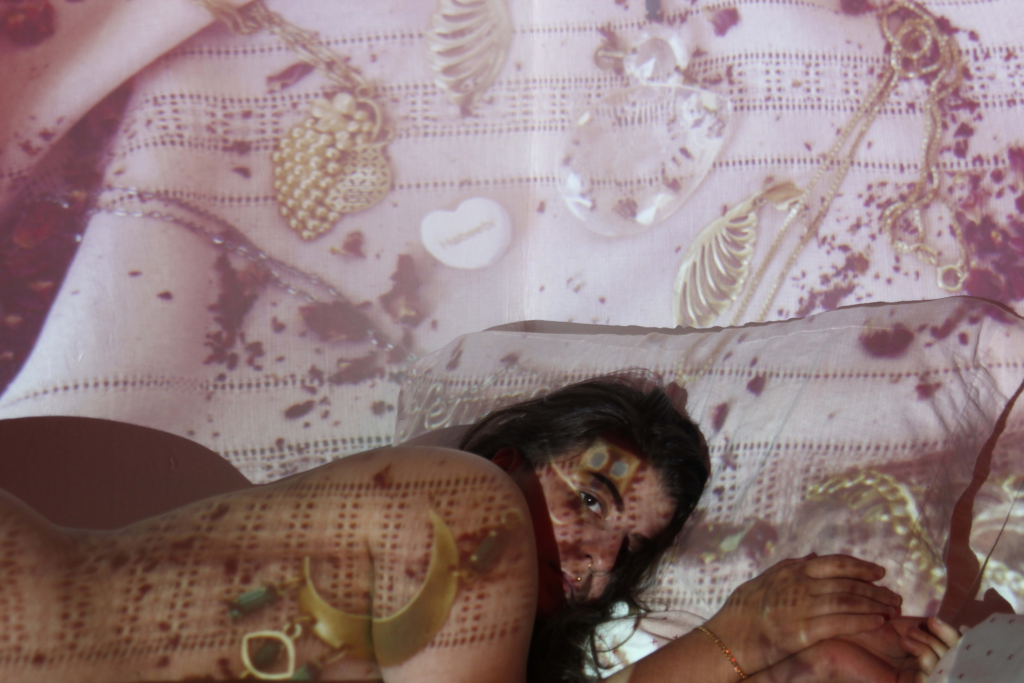
Christina Hajjar, Illuminations, 2020
Back to the dance floor,
Bodies dance around you.
All around you.
Being on the dance floor is like graduating out in the world.
You were absent the day your friends studied the curriculum of the body. What if you break it apart into separate courses: the hands, the head, the lungs, the feet, the legs, the neck, the face, the nose, the breath, the chest, the lungs.
Let’s hold a meeting and ask each body part to return what had been assigned to it.
Can we change the code of our bodies? Let’s strip everything and redefine it.
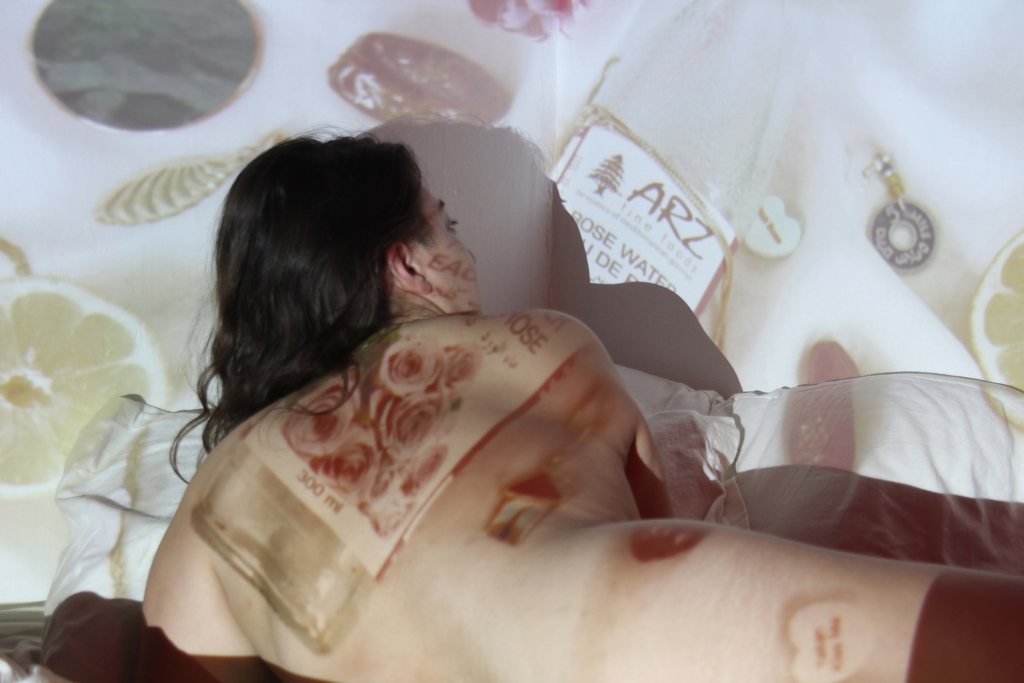
Christina Hajjar, Illuminations, 2020
ARM
Nature: branch.
Father: honor.
Mother: beating.
Friend: helping.
CHEST: SAY IT!
LUNGS: can’t breathe.
LUNGS: sighing.
CHEST: SAY IT!
LEGS:
[redacted]: FREEZE.
[redacted]: RUN.
NECK: Look behind you!
CHEST: SAY IT!
LEGS: RUN.
LEGS: dance!
LEGS: dance!
LEGS: dance!
You close your eyes on the dance floor to protect yourself with a cape of invisibility, like a child’s safety blanket.
The longer you keep your eyes closed, the smaller you become, until you disappear.
It is a good thing.
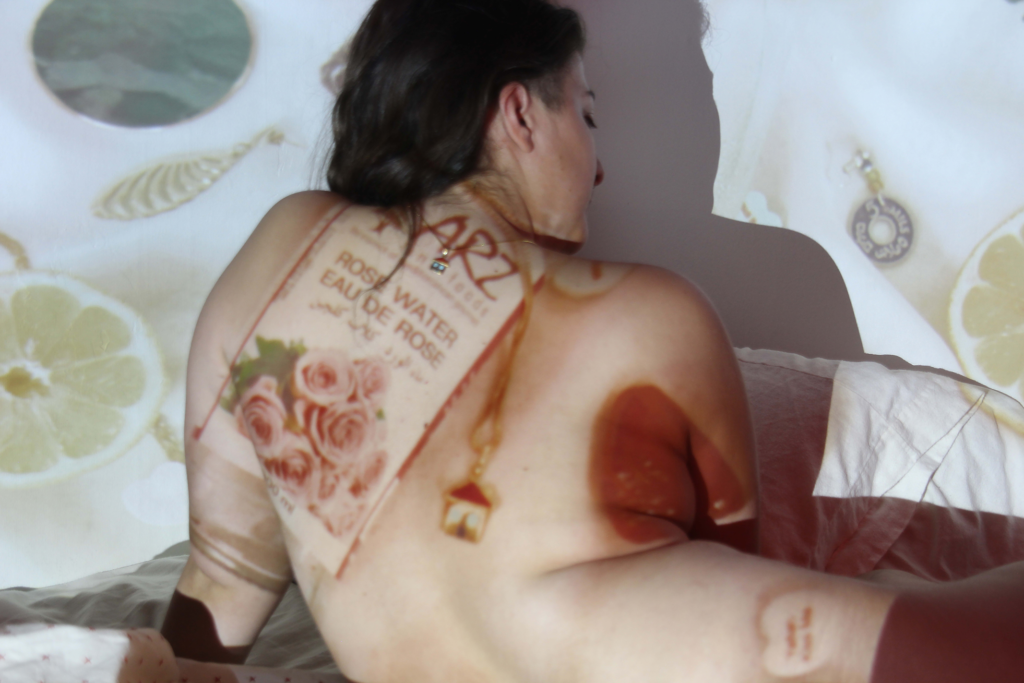
Christina Hajjar, Illuminations, 2020
You dance and you have forgotten all the people you have ever known. When you close your eyes on the dance floor, birth certificates don’t exist, or news of death, big words like “systematic violence,” burned meals, break-up scenes, heartbreaking sentences on repeat, or angry parents, or the inner homes you built out of unspoken words.
RESPONSE: FREEZEBUTMUSTDANCERIGHTNOW!
You want to trust the world to disappear, and you want to trust that it will be there when you choose to open your eyes, whenever that may be.
What if you close your eyes on the dance floor,
only to wake up to find your body has been snatched,
just like how sandals disappear from in front of the holy mosque as people are too busy trusting god to hold with care what they use to carry themselves through this world.
When you close your eyes,
you build worlds and worlds and worlds so that no one would dare tell you that you don’t belong. You’ll give other peoples’ worlds back to them.
“Take it back. It did not suit me. ”
When you close your eyes,
you want to trust that you can be absent and be okay. You want to trust that you can return anytime,
and that your body will still be there,
and that the people you love will still be there,
dancing around you.
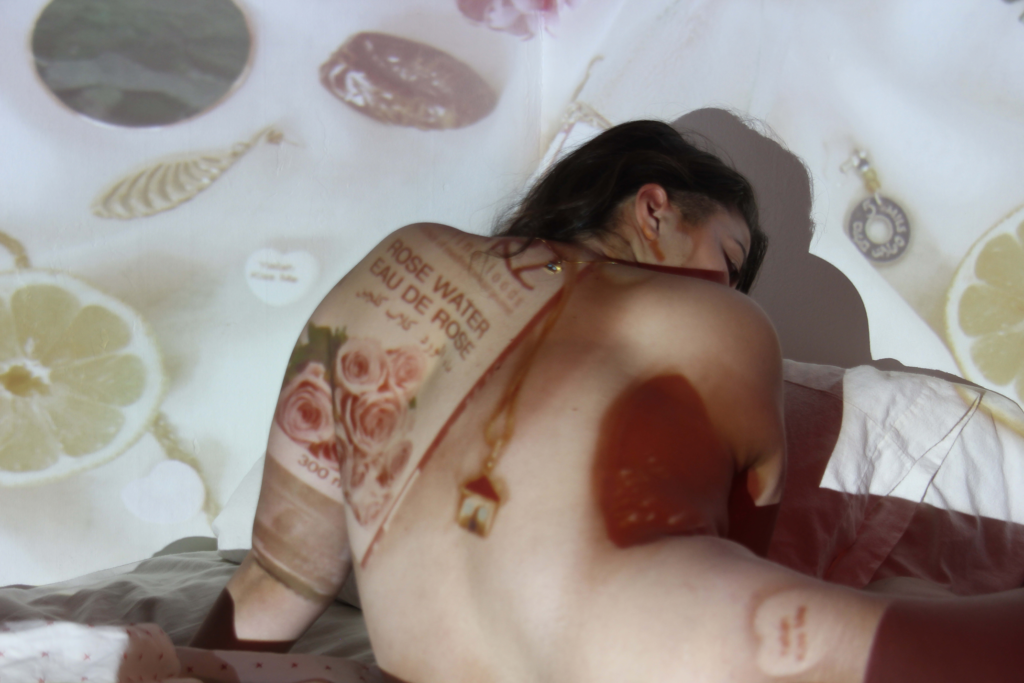
Christina Hajjar, Illuminations, 2020
In the logic of the survivor’s body, any potential sexual attraction will lead to contact, whether coerced or forced. It believes that it will be taken and claimed.
A beautiful person on the dance floor approaches, glares, so beautiful.
They get closer, it gets scarier.
I would’ve loved them. I would dance with them if I could.
They walk away.
Away smoking.
Just a person, not evil, a person.
SYSTEM WARNING
Look, a very well thought out haircut, a person, it must’ve cost a fortune.
Look, a shirt most likely thrifted. They must’ve been excited to wear it today.
[But cute people are also capable of harm.]
SYSTEM WARNING
It’s just a person. They probably have an abbreviated mental condition, a COVID scare, and a parking ticket that humanizes them.
They were most likely rejected by at least ten people before your body profiled them into an evil monster.
WARNING: THREAT
[OK]. [ IGNORE]. [CONTINUE]
Do I believe it? A person?
WARNING: THREAT
[OK]. [ IGNORE]. [CONTINUE]
A person. A name grammatically classified as a proper noun, a birth certificate, embarrassing memories.
WARNING: THREAT
[OK]. [ IGNORE]. [CONTINUE]
A person?
A person with friends, real and imaginary.
A person?
EMOTION: FEAR
RESPONSE: FREEZE
[OK]
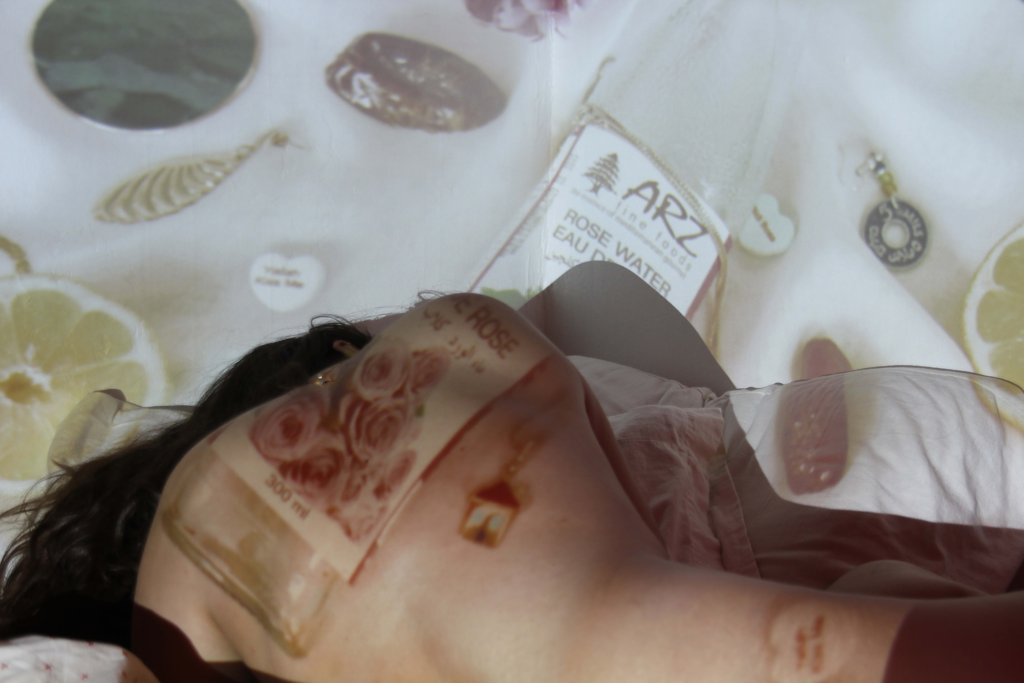
Christina Hajjar, Illuminations, 2020
How to introduce two bodies to each other, while both carry a tremendous amount of pain manufactured elsewhere but present itself as a new arrival? Very expensive. How can these bodies not spill that pain onto each other, and instead learn to detox safely, side by side?
[UNDO]
One body on another.
It grows.
And grows.
And grows.
Moss.
[SAVE / SAVE AS SAFE]
bodies dance around me.
If you hold those you love long enough, and for hours and hours…
If you hold those you love like a full-time job, 8 hours a day with
paid sick stay-by-your-side days,
would that be enough?
bodies I’m not scared of.
Here, I’ll hold your hand. somebody’s happy.
somebody’s elbow, dancing.
I will be boring with you.
somebody’s hair against my shoulder.
It’s okay. somebody’s twirling, happy.
But if it’s not okay right now.
somebody’s glowing.
Maybe it will be okay tomorrow. it’s just people. it’s just people dancing.
If not, I will still be here, holding your hand.
I’ll hold your hand and we will go into the crowd.
We will walk around with a measuring tape
and measure a safe distance from those we love:
I love you,
and here are a hundred centimeters why:

